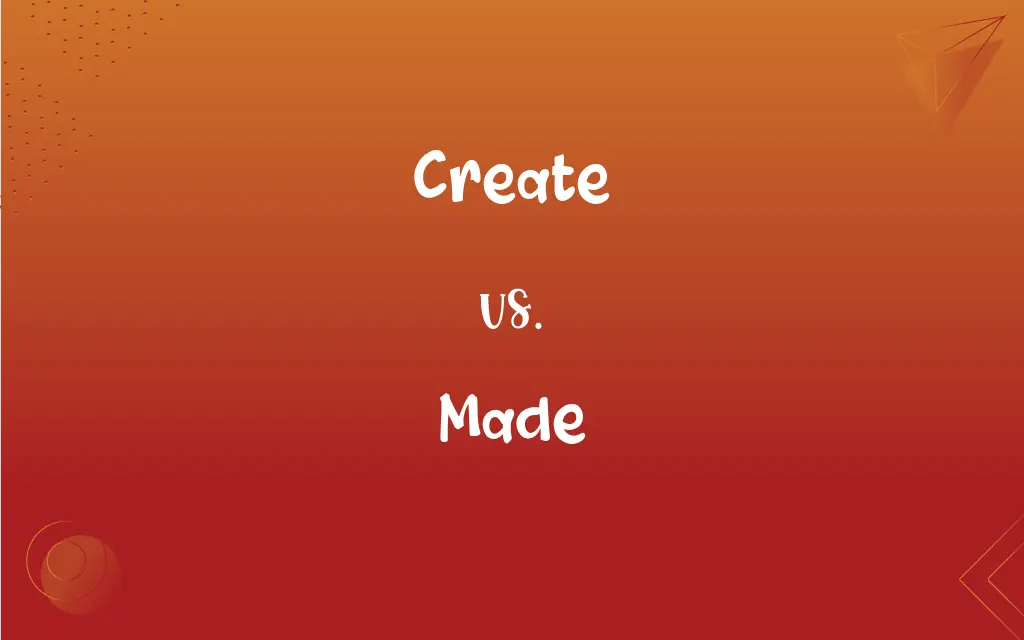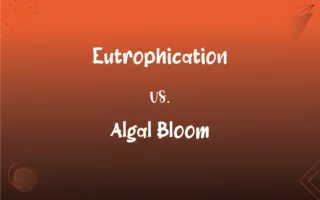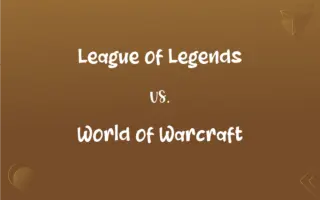Create vs. Made: What's the Difference?
Edited by Aimie Carlson || By Janet White || Published on February 16, 2024
"Create" implies bringing something into existence with originality or artistry, while "made" generally refers to the process of constructing something from existing materials.

Key Differences
Create often conveys the idea of originality and innovation, implying the formation of something new or previously non-existent. It suggests a process of conceptualizing and bringing forth unique ideas or items. Made, on the other hand, is a more general term that refers to the act of constructing, assembling, or producing something, usually from existing materials or according to a pre-existing design.
The word create is commonly associated with artistic or intellectual activities. It implies a higher degree of creativity and original thought, such as in art, literature, or innovation. In contrast, made is a broader term that encompasses a wide range of activities, from simple assembly to complex manufacturing, and does not necessarily imply originality or artistry.
Create also carries a sense of initiating something for the first time. It involves the process of bringing something into existence that didn't exist before in that form. Whereas, made is often used to describe the outcome of altering, transforming, or putting together existing materials or ideas into a finished product.
In the context of authorship and ownership, create is typically used to denote the origin of a concept or idea, often associated with the creator's identity or personal touch. Made, however, focuses more on the process of production and can refer to items produced en masse or through a collaborative or mechanical process.
In terms of usage, create is often used in a more abstract sense, referring to the conception and realization of ideas, while made is used in a more concrete sense, emphasizing the physical process of constructing or manufacturing.
ADVERTISEMENT
Comparison Chart
Implication
Originality and innovation
Construction or assembly
Association
Artistic or intellectual activities
Broad range of production activities
Focus
Initiation and conception
Outcome and transformation
Relation to Authorship
Linked to creator’s identity
More general, can be anonymous
Sense
Abstract conception
Physical process
ADVERTISEMENT
Create and Made Definitions
Create
To bring something into existence through imagination or innovation.
She aimed to create a new painting technique.
Made
To construct or assemble something from existing materials.
She made a beautiful dress from vintage fabric.
Create
The act of forming something original or novel.
The author set out to create a unique fantasy world.
Made
The process of altering or transforming materials into a finished product.
The artisan made intricate jewelry by hand.
Create
To produce through artistic or intellectual effort.
He creates music that blends multiple genres.
Made
To execute or perform a task leading to a tangible outcome.
They made a documentary on local history.
Create
The process of conceptualizing and actualizing new ideas.
They aimed to create a sustainable urban design.
Made
To form by combining or putting together components.
He made a successful business strategy.
Create
Originating something that did not exist before.
The chef loved to create innovative dishes.
Made
The act of producing or manufacturing something.
The company made thousands of toys daily.
Create
To cause to exist; bring into being
Created a new music school.
Made
Past tense and past participle of make.
FAQs
What does it mean to create something?
It means bringing something new or original into existence.
Can businesses create products?
Yes, especially when introducing innovative or unique products.
What does "made" imply?
It implies constructing or assembling something from existing materials.
Does "create" imply a single creator?
Often, but it can also involve collaborative efforts.
Does "made" suggest mass production?
It can, as it encompasses both individual and mass production processes.
Does "create" require special skills?
It often requires creativity or innovative thinking.
Can "create" refer to physical objects?
Yes, but it often emphasizes the originality or concept behind the object.
Is "create" limited to artistic endeavors?
No, it can apply to any field involving innovation or original ideas.
Can something be created and made?
Yes, something can be created (conceptualized) and then made (physically produced).
Is software created or made?
Software is typically created, emphasizing its innovative design and concept.
Is "create" a more active process than "made"?
Both are active, but "create" often involves more conceptualization.
Can "made" imply customization?
Yes, especially in the context of tailor-made or custom-made items.
Can ideas be made?
No, ideas are generally created, not made.
Can "made" refer to handcrafted items?
Yes, "made" is often used for handcrafted or manufactured items.
Is "made" appropriate for describing digital content?
Yes, but "create" is often preferred to emphasize originality and design.
Do chefs create or make meals?
Chefs can both create (design new dishes) and make (prepare the dishes).
Are songs created or made?
Songs are usually created, focusing on the composition and originality.
Is "made" used for building construction?
Yes, we often say a building was made, focusing on its construction.
Can "made" refer to altering existing items?
Yes, it can involve modifying or combining existing items.
Do artists create or make art?
Artists create art, highlighting the originality and creativity involved.
About Author
Written by
Janet WhiteJanet White has been an esteemed writer and blogger for Difference Wiki. Holding a Master's degree in Science and Medical Journalism from the prestigious Boston University, she has consistently demonstrated her expertise and passion for her field. When she's not immersed in her work, Janet relishes her time exercising, delving into a good book, and cherishing moments with friends and family.
Edited by
Aimie CarlsonAimie Carlson, holding a master's degree in English literature, is a fervent English language enthusiast. She lends her writing talents to Difference Wiki, a prominent website that specializes in comparisons, offering readers insightful analyses that both captivate and inform.







































































